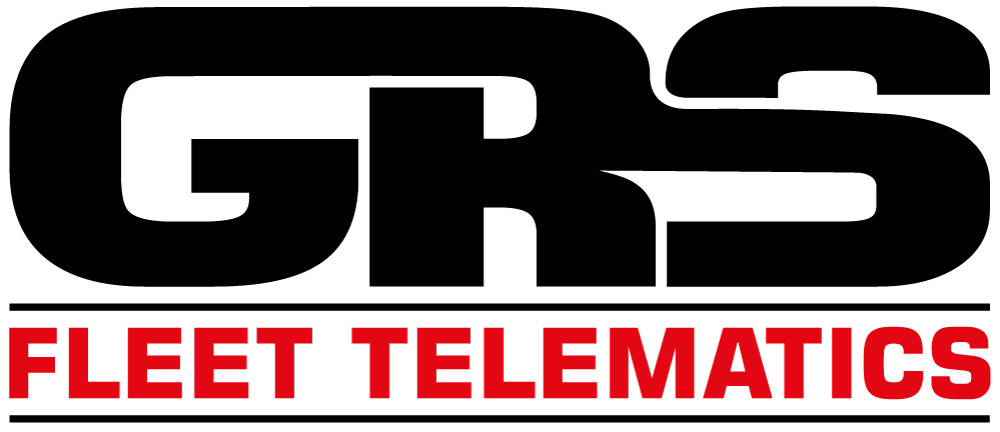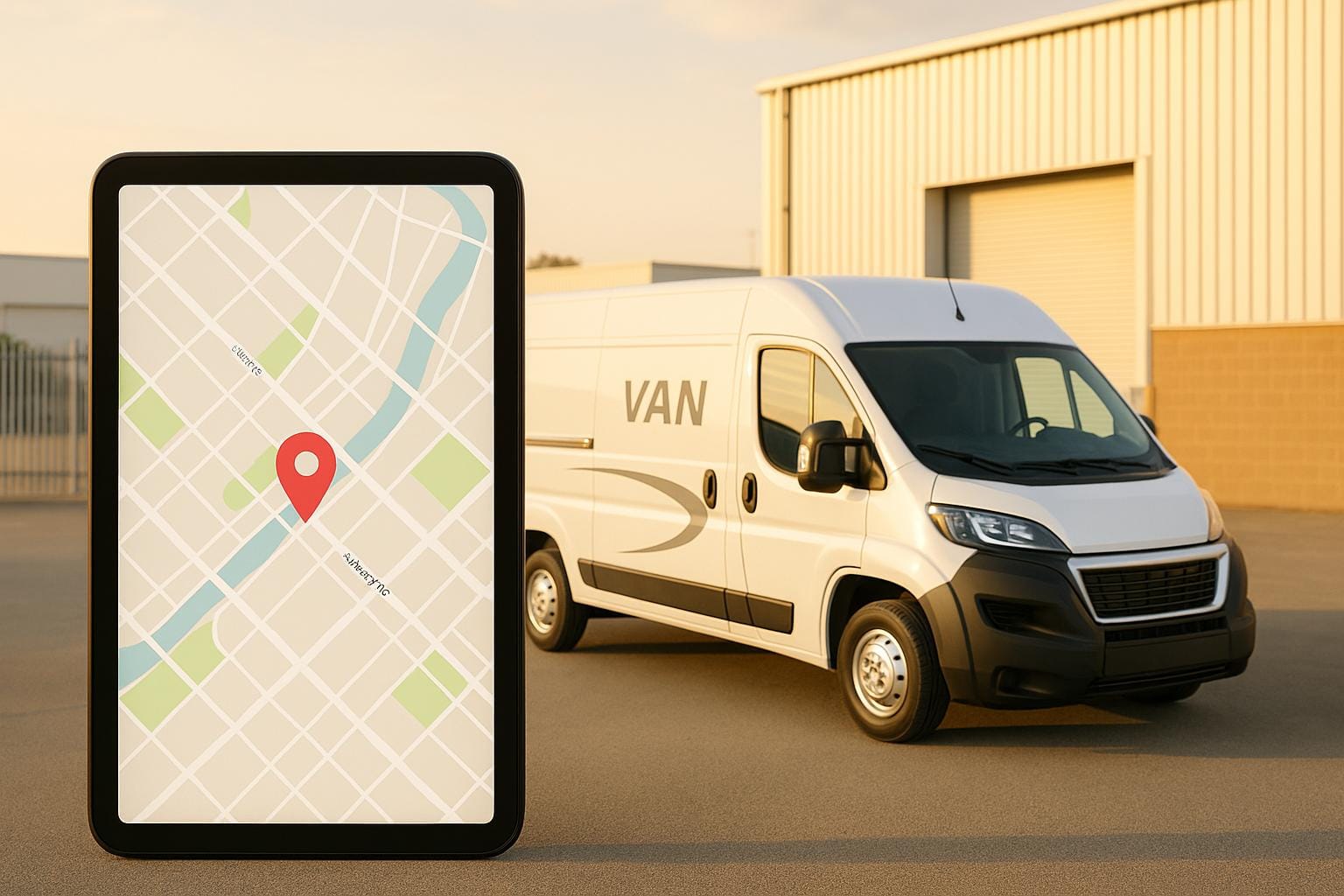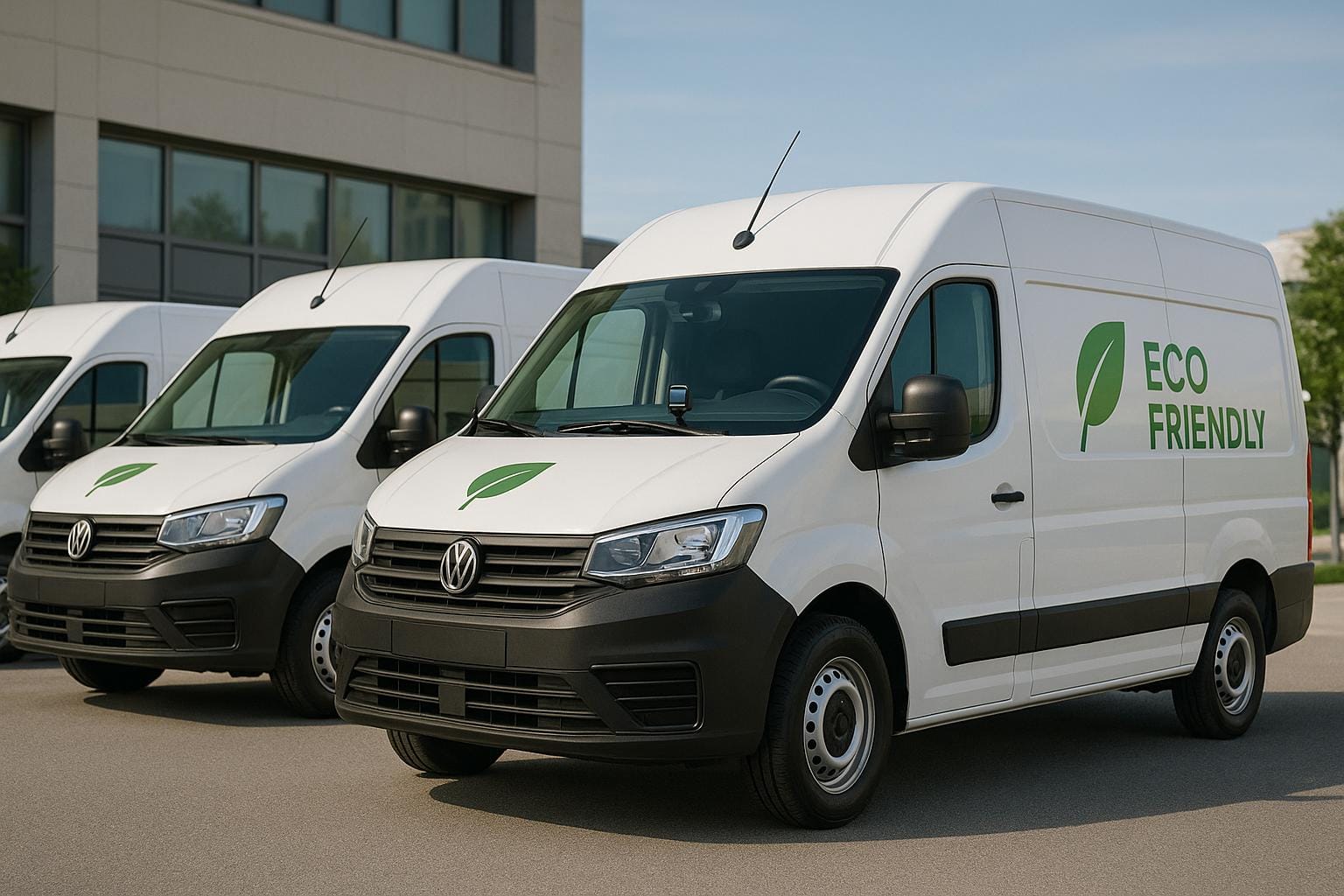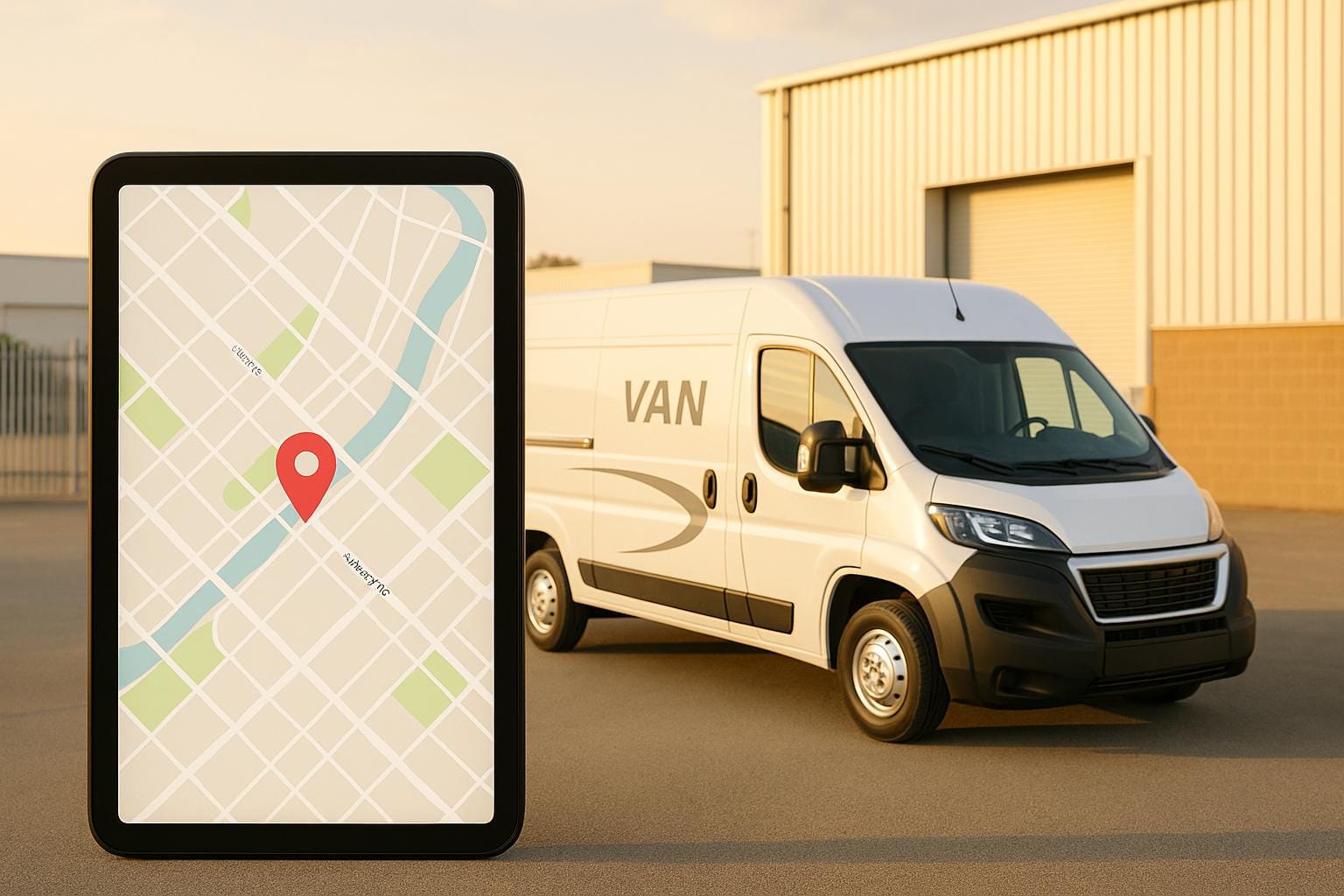Van tracking systems help UK businesses monitor vehicles, reduce costs, and improve safety. Using GPS, they provide live updates on locations, optimise routes, and track driver behaviour. These systems also cut fuel usage and can lower insurance premiums. Popular options, like GRS Fleet Telematics, offer affordable pricing and high recovery rates for stolen vehicles, while alternatives provide advanced tools like driver safety monitoring and remote immobilisation. The right choice depends on fleet size, budget, and specific needs.
Key Benefits:
- Live GPS Tracking: Real-time updates improve route planning and response times.
- Cost Savings: Reduced fuel use and insurance discounts.
- Driver Monitoring: Tools to promote safer driving habits.
- Security Features: Dual-trackers and geofencing enhance theft prevention.
Quick Tip: Compare features, costs, and recovery rates to find the best system for your fleet.
GPS vehicle trackers - Pro Vs DIY - setup instructions
1. GRS Fleet Telematics
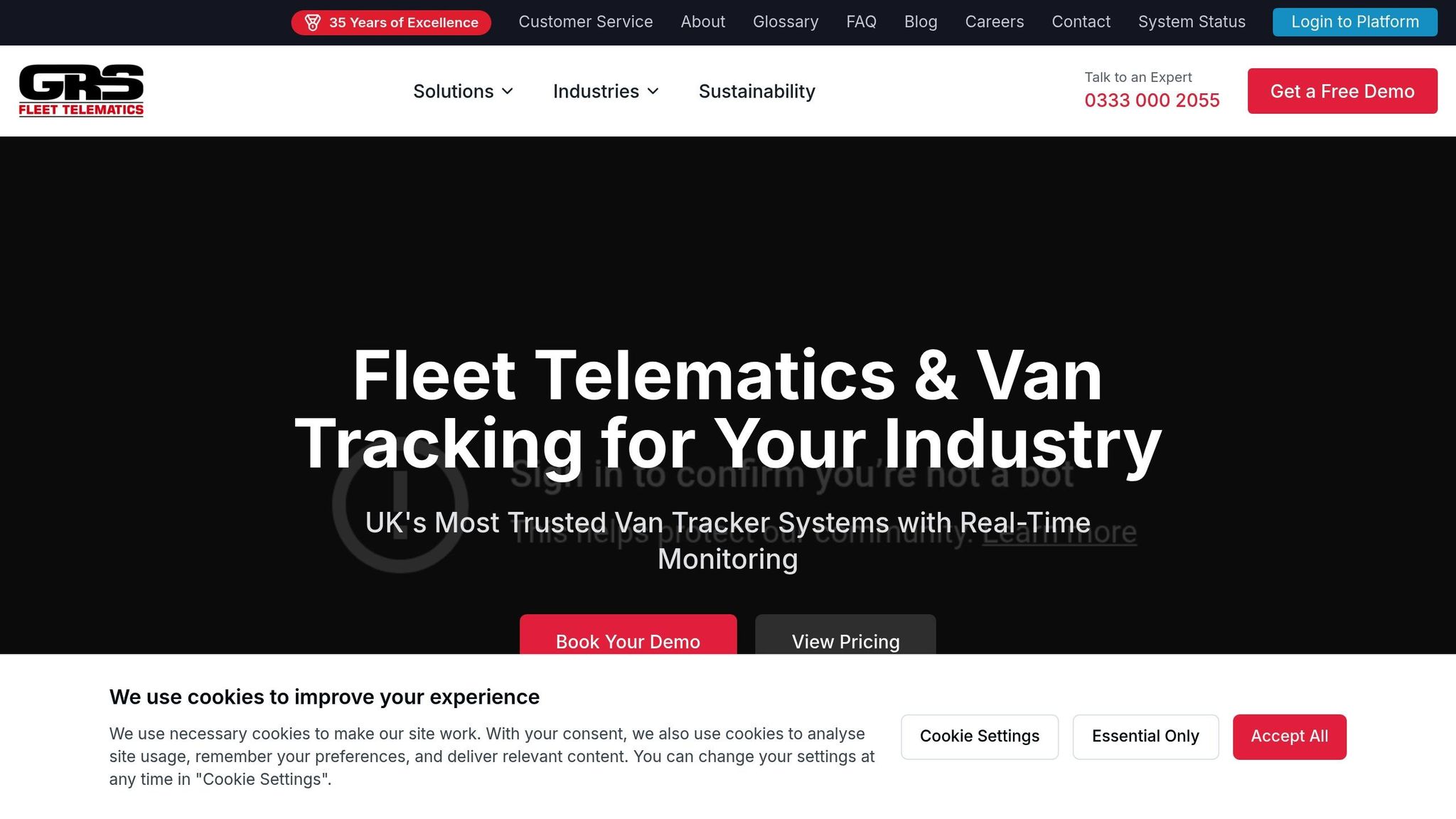
With more than three decades of expertise, GRS Fleet Telematics offers advanced tracking solutions designed to meet the demands of modern fleet management.
Real-Time GPS Tracking
GRS provides continuous real-time GPS tracking through cutting-edge devices. Fleet managers can access live location updates via a centralised platform, enabling them to oversee routes in progress, evaluate journey trends, and make on-the-spot adjustments. This capability helps optimise routes and ensures swift responses to unexpected incidents.
Dual-Tracker Security
The dual-tracker system combines GPS with RF or GSM technology, ensuring uninterrupted location data. This robust setup achieves an impressive 91% recovery rate for stolen vehicles. Beyond security, this technology enhances overall fleet management by providing reliable tracking under any circumstances.
Fleet Management
The centralised dashboard is a powerful tool for fleet managers, allowing them to monitor multiple vehicles, track routes, analyse journey data, and generate reports all in one place. These features help improve efficiency, cut fuel costs, and streamline maintenance. GRS claims a return on investment within 90 days, with potential savings of £1,000–£2,000 per vehicle annually. Monthly subscriptions start at £7.99 per vehicle, covering SIM costs, data transmission, platform access, and dedicated customer support.
2. Alternative Van Tracking Systems
While GRS Fleet Telematics has established itself as a reliable choice, there are other systems available that bring different features to the table. These options may better align with specific operational requirements or budget considerations.
Real-Time GPS Tracking
Some alternative systems enhance basic GPS functionality with advanced technologies. For instance, Differential GPS and Satellite-Based Augmentation Systems improve accuracy, even in areas where signals are typically weak. Additionally, certain systems incorporate multiple satellite networks, ensuring more dependable tracking. These improvements not only refine location accuracy but also provide a foundation for comparing security and safety features.
Dual-Tracker Security
Dual-tracker systems combine GPS with technologies like RF or GSM, achieving recovery rates of over 90% in many cases. Features such as automatic driver recognition and integration with law enforcement further enhance their effectiveness. Geofencing, paired with automated alerts, can increase stolen vehicle recovery rates by up to 45%, assuming the geofence settings are optimised to reduce false alarms. Beyond theft prevention, some of these systems also delve into driver behaviour analysis, adding another layer of functionality.
Driver Safety Monitoring
Driver safety monitoring tools focus on tracking behaviours such as harsh braking and sudden acceleration. These systems often include maintenance alerts, helping to prevent costly breakdowns. Some platforms take this a step further by offering driver scoring, which encourages safer driving habits and promotes accountability.
Fleet Management
Fleet management remains a core feature of many tracking solutions. Pricing for these systems typically ranges from £5 to £30 per vehicle each month, with hardware costs varying depending on the configuration and contract terms. Studies show that 36% of organisations report lower fuel costs after adopting fleet tracking systems, a notable advantage given that fuel expenses can make up as much as 60% of total fleet costs.
The industry itself is evolving, as seen with Movolytics' acquisition by ABAX in December 2023, signalling ongoing consolidation and growth in the sector. Whether businesses are looking for individual tracking, asset protection, or full-scale fleet management, it’s essential to find a system that strikes the right balance between functionality and ease of use.
Advantages and Disadvantages
When considering van tracking systems, weighing the pros and cons of each option is crucial for businesses aiming to make well-informed decisions. Both GRS Fleet Telematics and other available systems come with their own strengths and challenges. Let’s break down these aspects to better understand their offerings.
GRS Fleet Telematics boasts a 91% recovery rate for stolen vehicles, thanks to its dual-tracker technology. It also provides 24/7 recovery support, professional installation, and a budget-friendly price of £7.99 per month, making it a solid choice for safeguarding high-value assets.
On the downside, GRS Fleet Telematics has limited public reviews, which can make it harder for potential customers to gauge its performance in real-world scenarios. While excelling in security, it may lack some of the advanced diagnostic tools found in higher-end systems.
Alternative systems, on the other hand, often include premium features like remote immobilisation and improved signal accuracy. For instance, Tracker Nano offers a discreet design, Smartrack ensures reliable signals even in challenging GPS and GSM environments, and Vodafone Automotive integrates mobile technology for remote immobilisation.
However, these alternatives tend to come with higher costs and more complex setups. Many premium options fall in the range of £10 to £20 per month, which is a notable increase over more affordable choices. Additionally, some systems require manual setup and ongoing maintenance, which can drive up the total cost of ownership.
| Feature | GRS Fleet Telematics | Alternative Systems |
|---|---|---|
| Pricing | From £7.99/month | Typically £8–£20/month |
| Recovery Rate | 91% advertised | Varies, often not disclosed |
| Security | Dual-tracker tech | 24/7 monitoring, immobilisation |
| Installation | Professional (free) | Professional (may cost extra) |
| Signal Resilience | Standard GPS/GSM | Enhanced anti-jamming (select models) |
| User Reviews | Limited feedback | Established user base |
Privacy concerns from drivers and challenges integrating with existing software are common issues across all GPS-based systems.
Cost considerations go beyond monthly fees, as shown in the table above. Businesses must also factor in installation charges, hardware costs, and contract terms. Some systems require an upfront purchase of devices, while others bundle hardware costs into their monthly plans. Importantly, many UK insurers offer lower premiums for vehicles equipped with Thatcham-approved tracking devices.
Ultimately, the right choice depends on a company’s specific needs. Businesses focused on security and affordability may lean towards GRS Fleet Telematics, while those seeking advanced diagnostics or premium features might prefer higher-priced alternatives. Factors like fleet size, operating regions, and existing tech infrastructure also play a critical role in the decision-making process. By understanding these differences, businesses can better identify the system that aligns with their priorities.
Conclusion
Choosing the right van tracking system for your UK fleet comes down to identifying what aligns best with your specific operational needs.
For businesses that prioritise security and affordability, GRS Fleet Telematics is a strong option. With dual-tracker technology, a 91% recovery rate, and a low monthly cost of just £7.99, it also includes dependable 24/7 support services. However, if you require advanced diagnostics or specialised features, exploring other systems may be beneficial - though these often come with higher subscription fees.
It's important to look beyond just the monthly costs. UK businesses should also consider the potential savings from improved efficiency and reduced fuel consumption over time. Additionally, many insurers offer discounts on premiums for vehicles fitted with Thatcham-approved tracking devices, which can lead to further financial benefits.
For smaller, local operations, basic tracking systems that focus on theft prevention may be sufficient. On the other hand, national fleets often require systems that provide detailed analytics and integrate seamlessly with existing business tools.
Another key factor is theft recovery. Tracking systems with strong recovery rates and established partnerships with UK police forces significantly increase the chances of retrieving stolen vehicles.
Before committing to a system, take the time to evaluate your fleet's specific needs, compare the total cost of ownership, and request a trial period. This careful approach will help ensure that the system you choose not only meets your operational requirements but also delivers real value for your investment.
FAQs
Can van tracking systems help UK businesses lower their insurance premiums?
Yes, van tracking systems can help lower insurance premiums for businesses in the UK by boosting vehicle security and minimising risk. Many insurers provide discounts - typically between 5% and 30% - when approved tracking devices like Thatcham Category S5 or S7 systems are installed. The exact discount depends on the type of tracker and the insurer's specific policies.
By showing a commitment to improved safety and security, businesses not only cut insurance costs but also gain better control over their fleets and greater peace of mind.
What should I consider when selecting a van tracking system for my fleet and budget?
When selecting a van tracking system, there are several important aspects to weigh up. One of the biggest considerations is whether the system can grow alongside your fleet. If you're managing a smaller fleet, basic GPS tracking might be all you need. But for larger fleets, more advanced features - like dual-tracker technology or stolen vehicle recovery - could be game-changers.
Another factor to think about is your budget. This includes both the upfront costs for installation and the ongoing subscription fees. The aim is to find a system that strikes the right balance between affordability and offering robust features that prioritise security and functionality.
Don’t forget to check if the system aligns with UK regulations and caters to the unique requirements of your fleet's operations. Taking these factors into account will help you choose a tracking system that not only improves security but also boosts efficiency and helps you manage costs effectively.
How do dual-tracker systems improve van security and help recover stolen vehicles?
Dual-tracker systems bring a strong layer of security to vans by combining two separate tracking technologies. This dual approach makes it far more challenging for thieves to tamper with or disable the system, ensuring constant monitoring even if one tracker is compromised.
Another advantage is their ability to provide highly accurate location data, which boosts recovery rates. This means stolen vans can be located and retrieved more quickly, offering greater protection and reassurance for your business operations.
